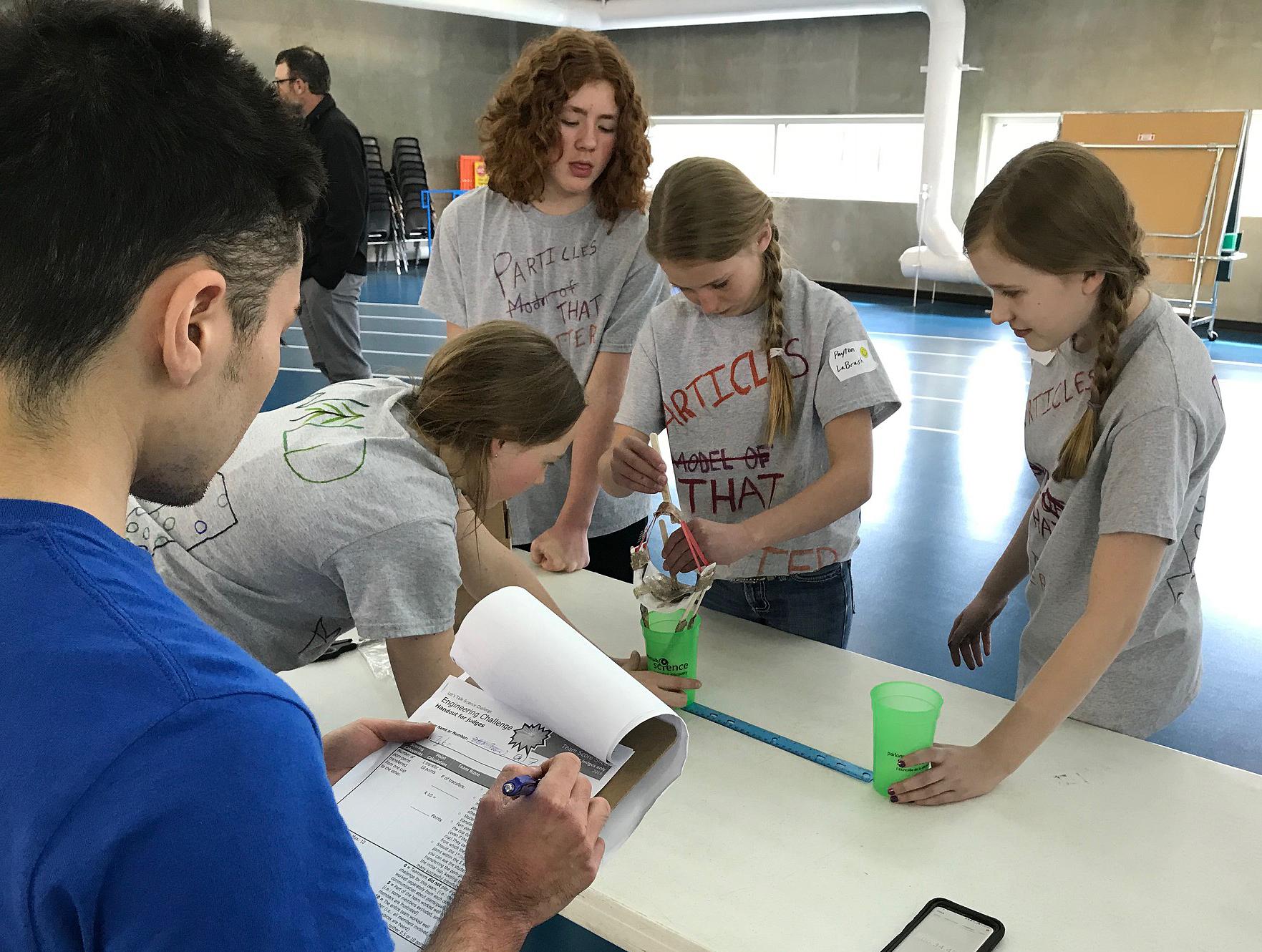More than 100 Grade 6–8 students caused the University of Lethbridge’s largest lecture hall to vibrate with energy during the first annual Let’s Talk Science Challenge on May 2. The students cheered and clapped in their excitement to participate in this competition.

“The students' engagement was remarkable and infectious," said Claire Niehaus, a volunteer with the Let’s Talk Science Program. "Throughout the entire day, they pushed each other and clearly enjoyed this competition. Their energy was almost too much to stand!”
In the morning, the students and their teachers arrived in buses from schools spanning the area from Milk River to Nanton. After an inspiring greeting by the energetic emcee, Sam Krause, the student teams competed for 1.5 hours in an intense science quiz. The room alternated between hurried whispering while the teams discussed their answers to loud cheers when they found out who got the question right. The quiz was rapid fire, as teams had only 15 seconds to answer the toughest questions.
“I would not have been able to answer most of these questions,” said Darren Gemmill, a coordinator with the Let’s Talk Science program.
The top team got more than 80 per cent of the marks in this quiz competition. The students easily outcompeted the volunteers—U of L science students—because they had studied a 100-page workbook for two months.
After the quiz competition, the students proceeded to the highlight of the Let’s Talk Science Challenge—the engineering competition in the afternoon. The curiosity and energy rose again as student teams gathered around tables with mysterious materials packed in a box. They were instructed to build a device to fulfill a specific task using only the materials in their box within a 30-minute time limit. In this short time, the students constructed grasping hands, scoops, tweezers and many more devices that were then put into practice.
Following a presentation on exoplanets by Dr. Chad Povey, an instructor in the Department of Physics and Astronomy, the award ceremony began.
The Elements of Confusion team (Jasmine Anchoris, Cole Blades, Kaden Joss, and Thomas Schmidt-Bellach) from J. T. Foster High School in Nanton captured first place.
The Diseased Frogs (Emily Miller, Maren Hardy, Mattias Neison, and Ty Romeril) from Raymond Junior High School took second place.
RADD (Danya Braun, Anaelle Ravelojaona, Reuben Peters, and Doren Diaz) from Immanual Christian High School in Lethbridge took third place.
In addition to the scientific competition, the team Particles THAT Matter from J.T. Foster High School in Nanton (students Taylor Wild, Rachel Peters, Payton LaBrash, and Mason Kohut) received the spirit award for displaying the best attitude. The team not only arrived in beautifully crafted, matching science T-shirts but also developed a fun cheer displaying the highest dedication and engagement with the Let’s Talk Science Challenge.
“This was a full success," said Nathan Hill, main organizer of the event and Let's Talk Science coordinator. "Clearly, this was the best event we have had this year and it is an example for the extraordinary teamwork of the UofL Let’s Talk Science team.”
In the end, everybody agreed: “We will have a second, annual Let’s Talk Science Challenge next year!”
The core leadership team of the Let’s Talk Science program consists of five graduate student coordinators working in collaboration with Dr. Ute Kothe as the faculty supervisor and Povey as advising instructor. They began preparing for the Let's Talk Science Challenge since September 2018. In total, 27 university and college campuses put on the Let’s Talk Science Challenge, with more than 3,000 Grade 6–8 students participating. On the actual day, many Let’s Talk Science volunteers, all undergraduate and graduate students at the U of Lethbridge, helped with judging and managing the students.
“There is no limit to what these young scientists can accomplish,” said Dr. Ute Kothe, Let's Talk Science supervisor.
